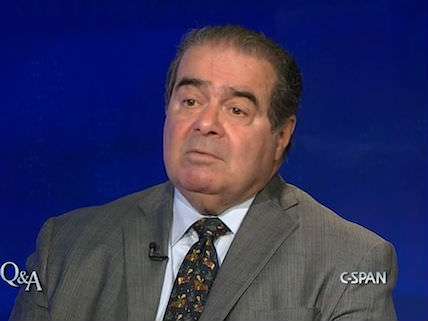Scalia's DOMA Dissent Highlights Conservative-Libertarian Split on Supreme Court

During the March 2010 oral argument in the case of McDonald v. Chicago, Justice Antonin Scalia upbraided the libertarian lawyer Alan Gura for asking the Supreme Court to follow the original meaning of the Privileges or Immunities Clause of the 14th Amendment and thereby force state and local officials to respect the individual right to keep and bear arms.
"What you argue is the darling of the professoriate, for sure," Scalia mocked in response to Gura's case for reviving the Privileges or Immunities Clause, "but it's also contrary to 140 years of our jurisprudence. Why do you want to undertake that burden instead of just arguing substantive due process, which as much as I think it's wrong, I have—even I have acquiesced in it?"
Substantive due process refers to the method whereby judges invalidate laws or regulations that violate what they determine to be a fundamental right secured by the Due Process Clause's protection of life, liberty, and property. In the eyes of its critics, including many legal conservatives such as Scalia, substantive due process is illegitimate because the clause was designed merely as a procedural safeguard, not as a tool to protect fundamental rights. But as his questioning of Gura indicated, Scalia ultimately set aside those qualms in the McDonald case, joining three other justices in relying on a substantive interpretation of the Due Process Clause in order to strike down Chicago's handgun ban. Only Justice Clarence Thomas voted to follow the original meaning of the Privileges or Immunities Clause in that case.
I was reminded of this jurisprudential maneuvering when reading Justice Scalia's dissent yesterday in the Defense of Marriage Act case United States v. Windsor. In it, Scalia not only accused the majority of harboring a "diseased" and "exalted conception" of judicial supremacy by striking down Section 3 of DOMA, he attacked his colleagues for committing the crime of substantive due process, the very approach he himself so recently "acquiesced in" when striking down a gun control law.
Scalia did not acknowledge that particular inconsistency. Instead, he attacked Justice Anthony Kennedy's majority opinion for its overly broad reading of liberty and for its corresponding lack of deference to the elected branches that had duly-enacted the Defense of Marriage Act. This case, Scalia declared at the outset of his dissent, "is about the power of our people to govern themselves."
If the overriding theme of Kennedy's DOMA opinion is the protection of liberty, the theme of Scalia's dissent is respect for majority rule. "The Constitution does not forbid the government to enforce traditional moral and sexual norms," he wrote, citing his dissent in Lawrence v. Texas (2003), the case where he voted to allow states to criminalize homosexual conduct. As for placing restrictions on the recognition of gay marriage, "We might have let the People decide."
It's a familiar conservative legal argument, drawn from the same philosophy of judicial deference to the will of the majority that has motivated many other thinkers on the right, including Robert Bork, who famously ranked majority rule higher than individual rights in his conception of the American system. "In wide areas of life," Bork wrote in his bestselling book The Tempting of America, "majorities are entitled to rule, if they wish, simply because they are majorities."
Bork's majoritarian approach prompted a response back in 1986 by the libertarian political scientist Stephen Macedo that I have long considered to be a definitive nutshell summary of the difference between conservative and libertarian legal thinking. As Macedo put it, "When conservatives like Bork treat rights as islands surrounded by a sea of government powers, they precisely reverse the view of the Founders as enshrined in the Constitution, wherein government powers are limited and specified and rendered as islands surrounded by a sea of individual rights."
The controversy over DOMA rests on a very similar philosophical split. According to Justice Kennedy, "though Congress has great authority to design laws to fit its own conception of sound national policy, it cannot deny the liberty protected by the Due Process Clause of the Fifth Amendment." According to Justice Scalia, "even setting aside traditional moral disapproval of same-sex marriage (or indeed same-sex sex), there are many perfectly valid—indeed, downright boring—justifying rationales for this legislation."
A sea of individual rights or a sea of government powers? Kennedy chose the former, Scalia endorsed the latter.


Show Comments (223)